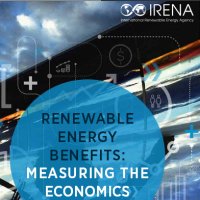The International Renewable Energy Agency (IRENA) has stated the economic case for increasing the share of renewable energy in the global energy mix to 36 percent by 2030.
Boosting to such a level would have major impacts on international trade of fossil fuels, plus increase global gross domestic product (GDP) by up to 1.1 percent, or approximately USD 1.3 trillion.
Renewable Energy Benefits: Measuring the Economics, is the latest report relating to IRENA’s REmap 2030 – a clean energy roadmap to doubling the share of renewable energy worldwide by 2030 from 2010 levels.
The new report examines the socio-economic benefits of transitioning to a renewable energy future and provides evidence of how this transition can mitigate climate change in a post-Paris environment.
“The recent Paris Agreement sent a strong signal for countries to move from negotiation to action and rapidly decarbonise the energy sector,” said Adnan Z. Amin, IRENA Director-General. “This analysis provides compelling evidence that achieving the needed energy transition would not only mitigate climate change, but also stimulate the economy, improve human welfare and boost employment worldwide.”
The report finds that achieving a 36 percent target globally would increase global GDP by USD 1.3 trillion by boosting new investment in renewable energy deployment and achieving higher rates of electrification.
The transition would halve the imports of coal and reduce the global demand for dirty fuels such as oil and gas, benefiting large energy importers like Japan, India, Korea and the European Union. Japan would see the largest positive GDP impact (2.3 percent) but Australia, Brazil, Germany, Mexico, South Africa and South Korea would also see growth of more than one percent each.
Employment in the global renewables industry would also see massive growth, rising from 9.2 million global jobs today, to more than 24 million by 2030.
IRENA states the benefits to the well-being of humanity are expected to be far larger than the impact of rising GDP levels.
“Doubling the share of renewables by 2030 has a positive impact on global welfare, which increases by 2.7 % compared to a 0.6% GDP improvement. If achieved through higher electrification of heat and transport, global welfare would further rise by 3.7%,” the report states.
Renewable Energy Benefits: Measuring the Economics can be viewed in full here (PDF)












































